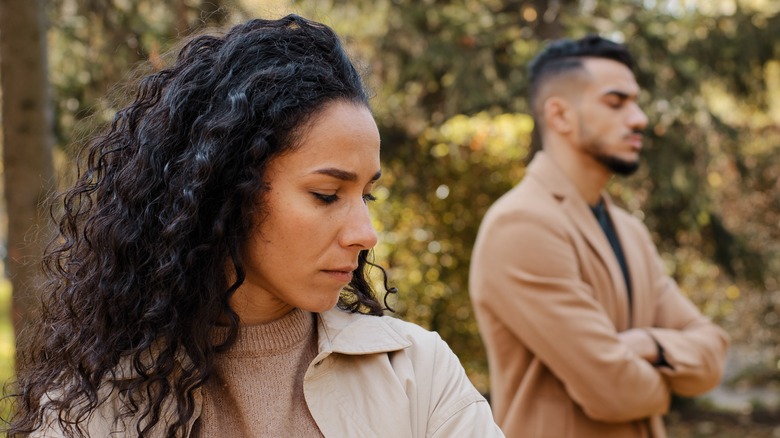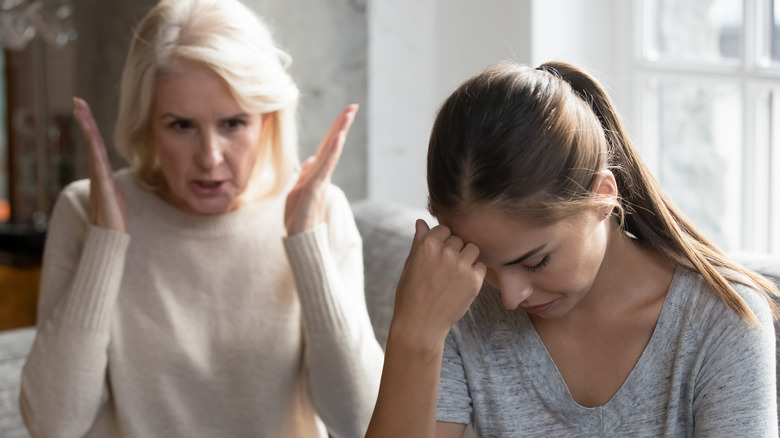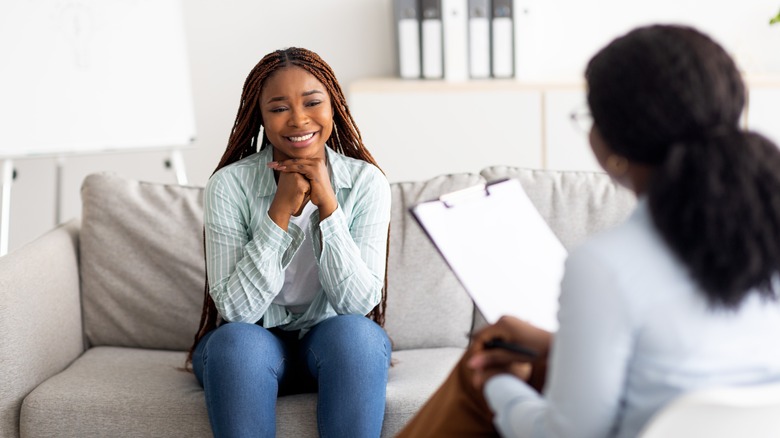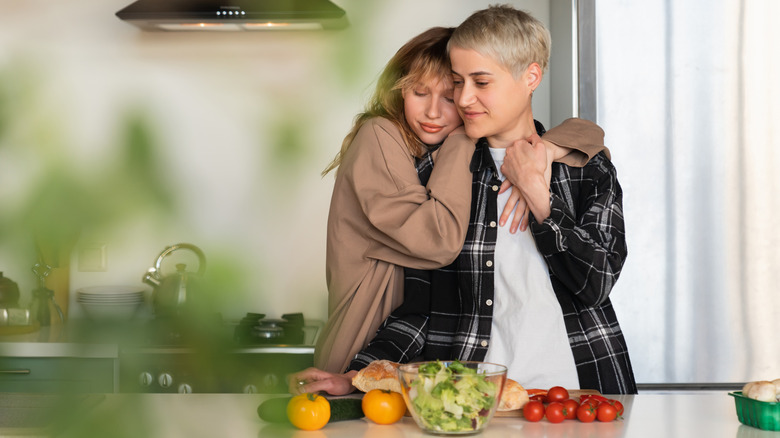Getting Divorced Young: Your Guide To Separating In Your 20s And 30s
It's normal to dream about your wedding day — most of us already know the cut and style of our dream wedding dress, we have a short list of bridesmaids, and an entire Pinterest board dedicated to color schemes and table settings. The start of happily ever after is fun to plan long before it happens, but it's not often that you fantasize about the end of that relationship. While every couple wants to believe they are the one that will last, about 50% of marriages end in divorce. Statistically speaking, if you get married between the ages of 18 and 25, the probability of getting divorced within the first 10 years is 48%; the risk of divorce in couples who marry after 25 drops to 25% (per Wilkinson & Finkbeiner).
While you listen to Adele's "30" (famously known as her divorce album) and ponder the repercussions of ending your marriage prematurely, remember that many people who got divorced young look back on it as one of the best decisions they ever made. But coming to that decision is no easy task — from dividing assets to sharing the news with your loved ones and realizing that the future you envisioned for yourself is changing, getting divorced is a complicated life change filled with emotions and complications. To help you cast your doubt aside and move forward, follow this guide to navigating a separation in your 20s and 30s.
Learn when it's time to call it quits
Being married is a complex relationship dynamic: it can be difficult to see the warning signs of a toxic relationship when you begin sharing finances and assets, raising children, and blending your life with another person at a young age. But marriage is about so much more than logistics, and your happiness should still be at the forefront of your priorities.
Surprisingly, getting into fights with your partner isn't the issue, it's a lack of fighting that might be a red flag. Obviously, fights that result in physical or emotional abuse are a huge problem, but the occasional disagreement is considered healthy for your growing relationship. When you find you are no longer interested in resolving conflict with your partner, something is wrong. Dr. Juliana Morris told Oprah Daily, "When you just can't be bothered anymore, it means something is missing," she continued, "You fight for each other. You fight for the relationship. The biggest problem is when there's no fight left."
If your partner stops becoming the person you rely on and instead becomes the person you want to avoid, if you can no longer trust them or feel like the slightest touch will make your skin crawl, odds are it's time to seriously consider ending the marriage. You know your relationship best, and if you can no longer find happiness in it, don't ignore the problem with the hopes that things will get better with age.
You are not a failure for getting divorced young
Contrary to popular belief, you are not doomed to get divorced just because you were a young bride. While "getting married too young" has been found as a common reason for divorce according to the National Library of Medicine, it is most likely a symptom of a troubled relationship, and not necessarily the cause. Clinical psychologist Dr. Rebecca Bergen revealed to Well + Good that most relationships end due to communication and commitment issues. She noted that "having the ability to manage conflict and know how to communicate is a more accurate predictor of whether or not a marriage will work than the age someone was when they got married." Couples who get divorced young were found to have many of the same problems as those who get divorced later in life, with the only difference being that they had less time in unhappy relationships than their older counterparts. Even with this knowledge, many young people feel a sense of shame and guilt for getting divorced young.
You may experience some loneliness when you get divorced young, but that feeling will fade with time and healing. It is likely that many of your peers are in the early stages of their serious relationships, with many planning weddings and young families. Others are not even considering long-term partners, and are having fun being single or dating around. Finding a supportive community will help your healing process and put your ending relationship into perspective.
Navigating other people's comments can be just as tough as the divorce itself
Making a decision to get divorced is only half the battle — once you and your future ex have come to a decision, the time has come to share the news with your loved ones. Per Well + Good, many young divorcees shared that they felt embarrassment for getting divorced early into their marriage. After a large wedding celebration where families and friends witness your vows of forever, getting divorced shortly after makes some feel like a failure. While this sentiment is absolutely not true, (remember, you are entitled to your own happiness first), many older generations hold this belief close to their chests.
You are likely to hear comments that imply you did not try hard enough to make the relationship work. Phrases like, "Marriage is hard work, you can't just quit when things get tough," can be extremely triggering. Other people will make your divorce about themselves and their values, saying, "I would never get divorced," or "Divorce is a sin." People get especially vocal when children are involved, giving you unsolicited advice about custody. They express disappointment for what the "kids have to endure" with divorced parents, unable to see that parental happiness is the best thing for children even if they are being raised in separate homes. As hard as it is, try brushing off these comments and understand that they most likely come from others' insecurities in their own relationships. Your sanity will thank you later.
Take your time when healing from your divorce
There is no one-size-fits-all solution when it comes to healing from a divorce. Some women finally shift their focus on their own self-care, investing in a new wardrobe and a lavish skin-care routine, pampering themselves in ways that their spouse never did. Others go full "Eat, Pray, Love" and decide to travel while they discover who they are outside of their ending marriage. Whether you're refocusing on your friendships or dyeing your hair a vibrant color in your bathroom sink, divorce is a type of grief that many aren't sure how to mourn.
Not all ways of healing are going to be super fun. Travel, self-care, and days out with your besties are all great for your healing, but adding a mental health professional is one of the best ways to make sense of what happened. This is where therapy can be extremely beneficial: you more than likely have some things to process after getting divorced, and sometimes your loved ones just don't know the right things to say. A therapist will provide a third-party perspective and tools you can use as you develop a healthy mindset and relationship with yourself while you navigate the next phase of your life. You may not ever fully heal, but you will be able to develop healthy ways of coping and understanding that you can carry into your next relationship.
Dating after divorce
Starting a new relationship after a divorce is no easy task. Experts don't recommend jumping back into the dating pool right away — even if you're just looking for a casual hookup to help you get over your ex, rebounding is a dangerous game to play. You put yourself at risk of getting hurt again if you restart your toxic relationship cycle with someone new before you've fully healed. You could also hurt someone else who may develop real feelings while you sift through your divorce trauma.
Beyond overcoming the emotional hurdles, the question of how to date after divorce can be a tricky one to answer. Many people who were married and divorced young never fully experienced the dating scene: whether you married your high school sweetheart or met your ex while working your first job, dating apps and hookup culture is most likely foreign territory. Surround yourself with good friends who will help usher you back into the single world. Let your bestie take the reins when making your dating profile, and heed the warnings of your single friends when deciding who you let slide into your DMs.
Most importantly, before you say yes to a date, decide when you feel comfortable revealing that you are divorced. Understand that some people may not be able to handle that baggage, and while that may sting, it's for the best. After all, you deserve someone who will see your past as a lesson learned, not a red flag.





